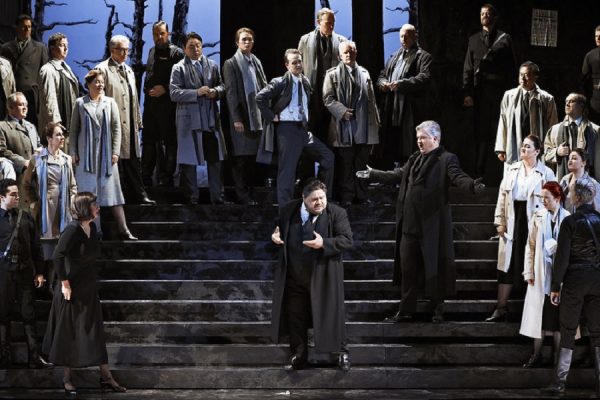
Opera / “La Juive”, by Jacques Fromental Halévy, Opera Australia. At Sydney Opera House until March 26. Reviewed by HELEN MUSA.
THIS “first” for Opera Australia, a co-production with the Opéra National de Lyon, was brought about by a group of Australian supporters known as the “La Juive” Syndicate.
It’s not very likely that Australian audiences will get to see many further revivals of this opera, as the subject matter is frankly abhorrent. Originally set in a semi-historical medieval world somewhere around Lake Constance in Central Europe, where Catholicism triumphs and Jews are considered outsiders to be expelled or, better still, thrown in the lake, it’s a thoroughly nasty story of lies and prejudice.
The composer, Halévy achieved fame primarily through this opera, with hundreds of performances around Europe after its first opening in 1837 usually involving immense casts dressed in lavish period costume.
Not in this production though. Bringing the sombre subject matter a few centuries forward, French director Olivier Py and his designer Pierre-André Weitz, have chosen a 1930s setting with hints of anti-Semitism on the rise, realised visually through a monochrome palette of blacks, whites and greys and the occasional splash of red to suggest lust, overlaying the opera with a 20th century discourse that foreshadow the Holocaust.
The props and symbols speak volumes. A seven-lamp candelabrum indicates Jewishness, the townsfolk of Constance bear banners and flags with nationalistic slogans befitting a Trump rally, then later reappear lifting wooden crosses to the sky to assert their superiority.
Weitz creates a magnificent setting, huge bookcases reaching to the ceiling to indicate several indoor locations, and more curiously, a constantly-shifting backdrop of lakeside winter trees suggesting flux, impermanence and impending doom. But the constant use of the revolve and the movements backwards and forwards of the trees quickly become irritating.
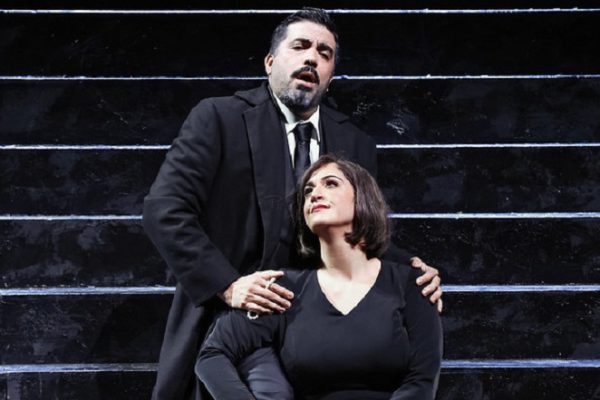
The dramatic content of “La Juive” (The Jewess) is of interest because its librettist is Eugene Scribe, architect of the famous “well-made play,” who, pulling all the stops out, created a complex set of triangular conflicts and a particularly diabolical twist at the end to bring the opera to a most devastating finale.
Briefly, into a narrow-minded community of townsfolk, sung with full-throated brilliance by Opera Australia’s chorus, comes Prince Léopold, (Francisco Brito) son of the Holy Roman Emperor but disguised as a Jewish artist to snare the affections of the young Jewish girl Rachel (Natalie Aroyan), daughter of the local jeweller, Eléazar (Diego Torre). Their love is, in this production at least, sexually charged.
The relationship is doomed from the start, especially because Léopold is also affianced or married (the libretto is unclear) to his cousin, the lovesick Princess Eudoxie (Ether Song) .
Complicating the plot further, the powerful Cardinal Brogni (David Parkin), seemingly a man with a conscience, proves to have history with Rachel’s father.
Then there’s the Princess, played by the vivacious coloratura soprano, Esther Song. She provides some of the few moments of light relief because as well as wanting to cement her relationship with the Prince by buying him jewellery, she likes a bit of fun in the bedroom.
Sombre the production may have been, but the singing, from the moment the chorus brought the rafters down in the opening triumphal scene, was never less than exciting, propelled by dynamic conductor Carlo Montanaro.
Of the two contrasting lead tenor parts, Léopold and Eléazar, Mexican tenor Diego Torre as the Jewish father had the lion’s share, famously in his aria, “Rachel! Quand du seigneur”, where he debates whether to offer his daughter the chance of life. This is surely a career highlight for Torre, whose dark dramatic tenor was in marked contrast to the lighter roles he often sings.
For Natalie Aroyan, too, this was a significant opportunity to show both the range of her voice and the power of her acting as she gave dignity to her tragic role.
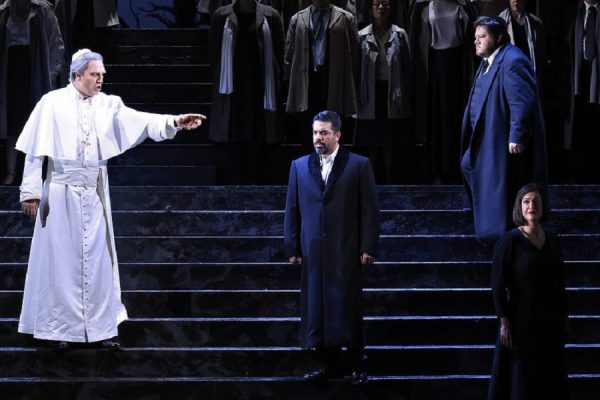
One of the most intriguing parts, and a plum role for bass David Parkin, is that of the Cardinal, formerly a married man whose wife and daughter apparently died in a catastrophic fire. He is the most nuanced of the characters, seen when he intervenes to save the Jewish father and daughter, begging them to save themselves by converting to Christianity. But Parkin often sounded inarticulate as he strained to reach his lower notes.
Musically, one of the high points of “La Juive” came in Act II following the Passover feast, where two consecutive trios see the characters locked in conflict, soliloquising, but in a complex vocal interaction.
Finally, there is the question of Py’s directing, which at first glance, sometimes seemed to ignore the libretto.
During an angry scene in Act III, Rachel tells Léopold to back off, but he’s already halfway across the stage. Soon after, she sings, “my father loathes you”, but nothing so far in the libretto has suggested that.
With the one exception of a sportive bedroom scene between the Prince and Princess, the intimate scenes are scarcely intimate at all. The doomed lovers press their lips hard against each other, but most other characters sing straight to the audience in a static, old-fashioned “stand and deliver” manner.
I suspect Py was attempting a kind of rhetorical examination of the debate about religion which can be seen in this opera, so the characters, treated with little verismo, become pawns in an argument rather than living people.
And yet, in the final moment when a shocking twist comes, Opera Australia’s magnificent singers and chorus bring this little-seen opera to a devastating conclusion.
It’s a rare moment.
Who can be trusted?
In a world of spin and confusion, there’s never been a more important time to support independent journalism in Canberra.
If you trust our work online and want to enforce the power of independent voices, I invite you to make a small contribution.
Every dollar of support is invested back into our journalism to help keep citynews.com.au strong and free.
Thank you,
Ian Meikle, editor
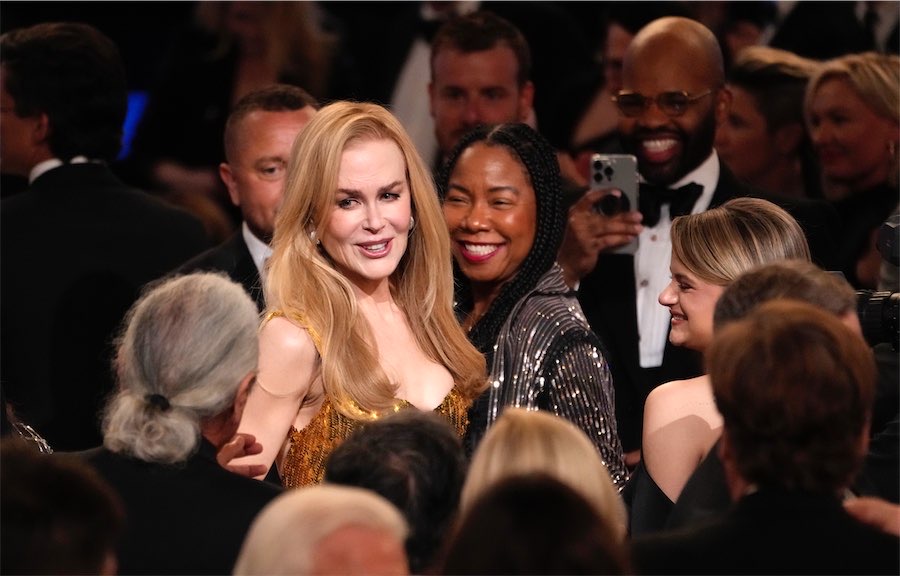
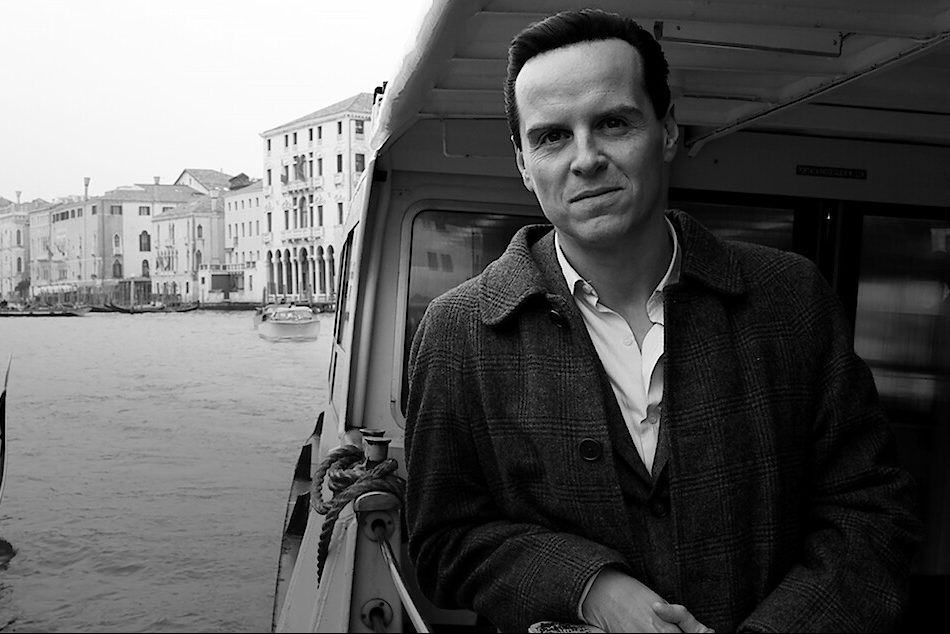


Leave a Reply